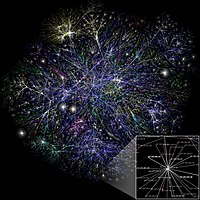
Photo from wikipedia
Sufficiently strong inter-site interactions in extended-Hubbard and XXZ spin models result in dynamically-bound clusters at neighboring sites. We show that the dynamics of these clusters in two-dimensional lattices is remarkably… Click to show full abstract
Sufficiently strong inter-site interactions in extended-Hubbard and XXZ spin models result in dynamically-bound clusters at neighboring sites. We show that the dynamics of these clusters in two-dimensional lattices is remarkably different and richer than that of repulsively-bound on-site clusters in gases without inter-site interactions. Whereas on-site pairs move in the same lattice as individual particles, nearest-neighbor dimers perform an interacting quantum walk in a different lattice geometry, leading to a peculiar dynamics characterized by more than one time scale. The latter is general for any lattice geometry, but it is especially relevant in triangular and diamond lattices, where dimers move resonantly in an effective kagome and Lieb lattice, respectively. As a result, dimers experience partial quasi-localization due to an effective flat band, and may move slower than longer clusters. This surprising link between anomalously slow quantum walk dynamics in these models and flat-band physics may be readily observed in experiments with lanthanide atoms.
Journal Title: Physical Review A
Year Published: 2020
Link to full text (if available)
Share on Social Media: Sign Up to like & get
recommendations!